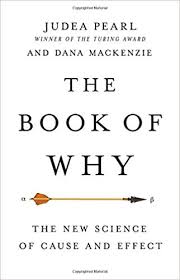Ye Olde Natural Philosophy Discussion Group
Reviews and comments on
Judea Pearl: The Book of Why: The
New Science of Cause and Effect [2018]

This is a book which argues against the dogma still widely prevalent in the field of statistics
that “we should never talk about cause and effect, only about statistical correlation”. In reality
what we are actually most concerned about is not mere correlation, but the genuine causes of things.
Although our opinions of the book varied somewhat within our group, our average rating on a scale
of 1 to 10 was a moderately low 4.38. Perhaps this is just because it is inherently difficult to
make discussions of statistics and statistical procedures all that exciting!
Scott, however, gave the book a rating of 7, and actually found it to be of considerable interest. We often hear about things like Bayesian analysis and Bayesian networks, for example, and this book explains pretty well what those things are all about. It is true that the abstract presentations of material like this are rather difficult to follow throughout the book. But fortunately Pearl gives a number of specific concrete examples which are much easier to follow and which make things much clearer. Still, the book is hard going at times. Some chapters are pretty straightforward, while others are more obscure.
Scott felt that in general Pearl makes a convincing argument against the old anti-cause-and-effect biases within statistics, and really does show there is a better way to analyze complicated processes and situations which can bring out what the real causes are, which are most important, and so forth. In short, he makes his case about causal models. Still, actually practicing this new art of causal analysis is not exactly easy! None of the members of our group came up with a good example on our own of doing this sort of thing in our own areas of interest.
Scott also says that from political and philosophical perspectives the book is no good at all. For example, several of the references to real world problems are about how to expand capitalist markets and maximize profits. F*@k that! Human beings should have interests in promoting human welfare, not capitalist exploitation. And although Pearl does say that he is a compatibilist when it comes to the issue of free will, he then goes on to talk about “the illusion of free will”—which makes you wonder if he understands what compatibilism even means! Pearl is still too totally naïve to take seriously on such matters. Fortunately most of the political and philosophical aspects of the book can just be ignored.
Rich said that he “didn’t love the book”. He agreed with Pearl’s general thesis about cause and effect and the necessity of locating the real causes of things. But he (and the rest of us) were disappointed that the author did not get more into artificial intelligence (AI) as he seemed to promise early in the book that he would. Rich gave the book a 5.
Ron gave it a 6, and commented that “this book was almost worthwhile”! He commented that it was hard to understand what the book was talking about, and that it seemed to be written mostly for others in the field of statistics.
Vicki, alone in our group, has actually been to conferences in which causal models were presented and discussed. She felt that Pearl had not adequately provided a base line for readers to move forward from. She also commented that this is not at all a good book to try to listen to in audio format (which she did). Vicki did like Pearl’s real world examples. But she didn’t like the math. And she said that the author didn’t actually provide any steps forward toward AI in the book like he promised. She gave the book a 5.
Rosie gave it a rating of just 1. She read it on an I-pad, where the diagrams were unfortunately hard to see. “I was lost from the start. But the examples were great. If his causal method actually works, then people should read it.”
Kevin didn’t read much of the book, and had no interest in it. So no rating.
John also only read part of the book. He had difficulty with the E-book format, which somehow disappeared from his digital library. He noted that the causal models or diagrams reminded him of Feynman Diagrams. He gave it a tentative rating of 4.
Kirby also gave it a 4. He said he almost quit reading it after the introduction. But he also noted that in his study of psychology he had had lots of statistic courses and therefore had some basis for reading this book. He felt that Pearl does have a good idea in the book, and is moving in the right direction. But Kirby agreed that Pearl did a poor job with connecting this all up with AI. However, he thought Pearl’s discussion of “free will” was interesting.
But Kirby also felt that this was a muddled book, “one of the most muddled books we’ve ever read”.
Barbara said the book “is a book of riddles”. She didn’t like it and said she couldn’t make any sense out of it. She said she didn’t understand any of the author’s equations. She rated the book a 3.
Return to our complete list of books.
Return to our Science Group home page.